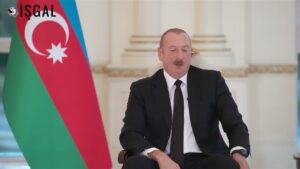
At a small grocery store in Derik, Syria, one dusty case of Sariyer soda water sits underneath a shelf. “The self-administration [of North and East Syria] gave us time to finish selling the Turkish products we had in stock, like this one,” said the store’s owner. “After this, we will not be ordering more.”
When Turkey launched attacks on Northeastern Syria in October 2019, ultimately killing hundreds and displacing hundreds of thousands, a campaign asking locals to boycott Turkish goods immediately followed. “It started in Iraqi Kurdistan, before the Turkish invasion. And after, it began here, as a means of protest against the Turkish attacks on Serekaniye and Gre-Spi,” said Massoud Mohammad, a professor at Rojava University and one of the organizers of Northeastern Syria’s boycott initiative. “We were really able to achieve a powerful result against the Turkish economy in a short time.”
Many of Mohammad’s university students have helped with the local initiative. According to their research, Turkish goods worth roughly $25 billion enter Syrian and Iraqi Kurdistan each year. “About 60% of this trade has been lost because of the boycott,” Mohammad said. “The process is ongoing. The boycott is bigger in Iraqi Kurdistan than in Rojava, because they have more alternatives for goods than we do.”
The Semalka border crossing, which links Syrian and Iraqi Kurdistan, is the point of entry for most of the goods found in Northeastern Syria. As part of the boycott initiative, Mohammad and other organizers worked to convince the administration to restrict the entrance of Turkish-made products at the crossing. They designed a series of clever billboards and posters depicting Turkish products as tools of war which can be seen throughout Northeastern Syria.
Mohsen Ali, head of the Rojava Merchants’ Union, and another of the boycott’s organizers, said that 70% of the products in stores in Northeastern Syria were Turkish. He says local business owners have been largely supportive of the initiative. “The traders agreed that it was important,” he said. “They worked to begin bringing items from Damascus, Aleppo, Iraqi Kurdistan, and Iran. The boycott is everything for us. It’s giving us a voice.” Ali says that in time, he hopes business owners will be able to bring machinery and raw goods into Northeastern Syria so that they can begin manufacturing their own products for consumers.
For now, the boycott provides a sense of control to a region severely lacking. “People are no longer feeling safe. There’s no stability anymore,” Mohammad said. “There was no logical reason for this Turkish invasion. They only want to conduct a demographic change and destroy our democratic system. The Kurds fought ISIS on behalf of the whole world, and we defeated ISIS. Now, it is the moral obligation of the US and global coalition to support us.”


